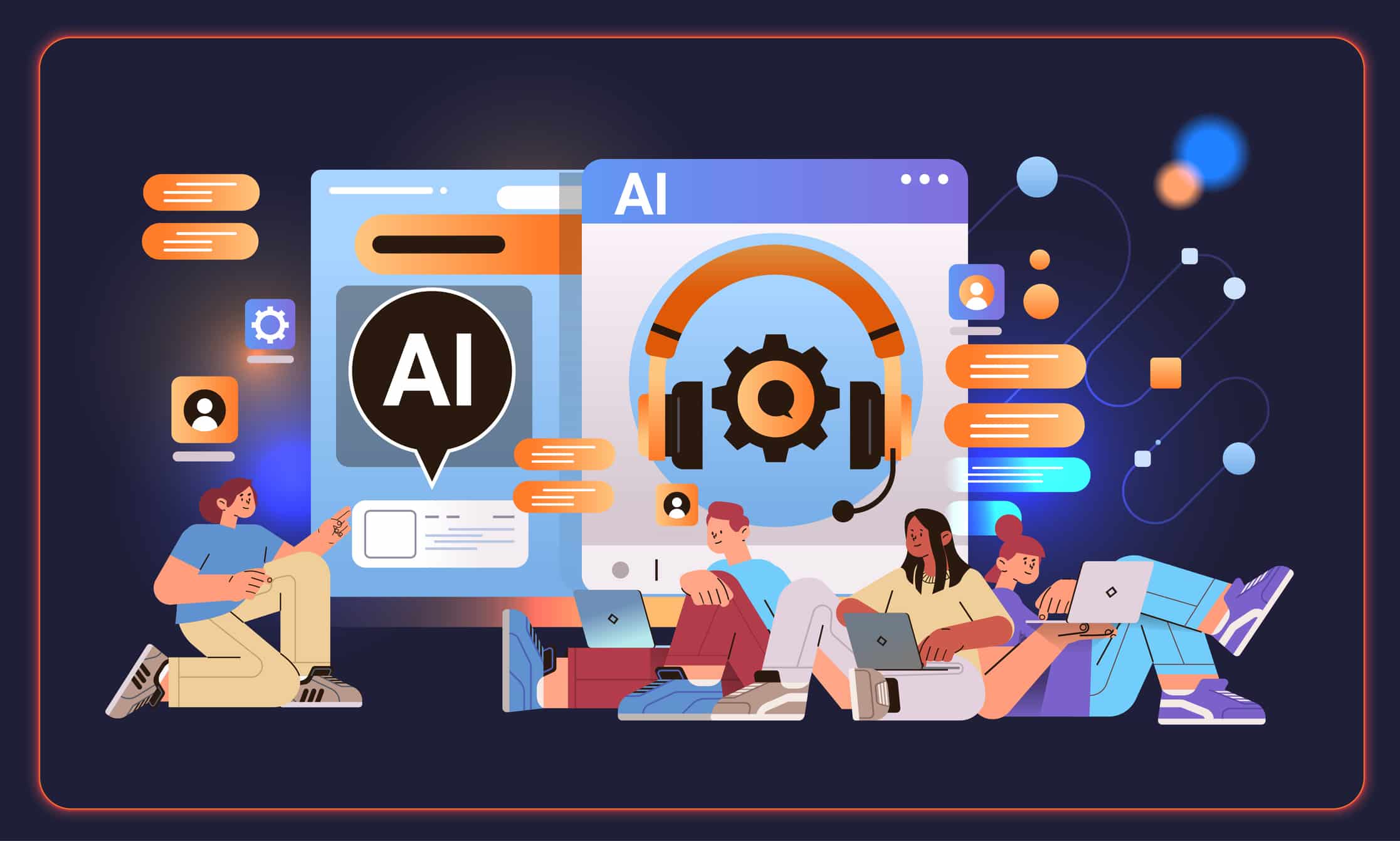In today’s fast-paced, competitive business environment, companies constantly seek ways to improve efficiency, reduce costs, and enhance customer satisfaction. One emerging technology proving highly effective in achieving these goals is using AI Agents for service lifecycle management (SLM). But what exactly is an AI Agent, and how can it drive value and efficiency for businesses—especially for Original Equipment Manufacturers (OEMs), their dealers, and service organizations like yours?

Understanding AI Agents
An AI Agent is a software program designed to perform tasks autonomously on a user’s or another system’s behalf. These agents interact with their environment, collect data, and use it to make decisions and execute actions to achieve specific goals. They can handle various functionalities, from natural language processing and decision-making to problem-solving and interacting with external environments.
Addressing Business Problems with AI Agents
Businesses across various manufacturing industries, including those that collect IoT and telematics data, face several common challenges:
- Unplanned Downtime: Equipment failures and unplanned downtime can lead to significant financial losses and operational disruptions.
- High Operational Costs: Maintenance, repair, and operational costs can substantially impact the bottom line.
- Inefficient Service Delivery: Delays and inefficiencies can lead to customer dissatisfaction and lost business opportunities.
- Complex Warranty Management: Managing warranties and handling claims can be time-consuming and prone to errors.
- Data Overload: Businesses often struggle to make sense of the vast amounts of data their operations generate.
AI Agents can address these challenges by leveraging advanced technologies such as machine learning, predictive analytics, and data integration for multiple business systems. Consider all the business systems you use to manage your business: CRM, ERP, Warranty, Telematics, Field Service, and Case Management. AI agents can perform simultaneous tasks across all of these systems to enable efficiencies and reduce the need for your team
to swivel chair, copy and paste, or use other painful, inadequate methods of doing business.
Enhancing Asset Performance and Uptime
One of the primary benefits of AI Agents is their ability to enhance asset performance and uptime. By analyzing historical data and real-time sensor inputs, AI Agents can predict failure probabilities for various components. This proactive approach allows businesses to schedule maintenance activities more effectively, reducing unplanned equipment downtime. For example, in the heavy equipment industry, AI-driven predictive maintenance can boost uptime by up to 50% and extend equipment lifespan by 20%. This improves operational efficiency and enhances customer satisfaction by ensuring equipment reliability.
Reducing Operational Costs
AI Agents play a crucial role in reducing operational costs. By predicting failures and optimizing maintenance schedules, businesses can minimize repair expenses and reduce the total cost of ownership (TCO). In sectors such as automotive and commercial trucks, maintenance costs can be substantial, and this can lead to significant savings. For instance, AI applications in the automotive after-sales market are expected to grow at a CAGR of 10.5% from 2023 to 2028, driven by diagnostics, predictive maintenance, and customer service advancements. AI Agents can also optimize fuel consumption and service scheduling, further driving cost efficiencies.
Improving Service Delivery and Customer Engagement
AI Agents enhance service delivery and customer engagement by providing real-time insights and accurate demand forecasts. This enables businesses to improve field support and first-time fix rates, which is particularly important in industries where downtime can significantly impact operations. Additionally, AI Agents can drive growth in parts and service sales by enabling informed, proactive customer engagement. By analyzing usage patterns and predicting future needs, businesses can offer timely recommendations for service and component replacements, boosting sales and strengthening customer relationships. In the commercial HVAC sector, AI applications are expected to grow significantly, driven by the need for energy efficiency and improved building management. AI can help reduce energy consumption by up to 30% in commercial buildings.
Streamlining Warranty Management
Warranty management is another area where AI Agents can substantially benefit OEMs and Service Organizations. AI Agents streamline the entire warranty process by automating
warranty approvals and detecting fraud. This leads to faster resolution times and improved customer satisfaction. In the commercial truck service industry, AI tools can reduce warranty claim processing time by up to 40%, leading to faster resolutions and improved customer trust. Additionally, AI-driven analytics can help identify common issues and optimize service schedules. In industries like off-road machinery, warranty claims can be complex and time-consuming, and this can result in significant operational efficiencies.
Reducing Transactional Work
AI Agents significantly reduce transactional work for companies by automating routine tasks and processes. This allows employees to focus on more strategic and value-added activities, enhancing productivity. For instance, AI Agents can handle data entry, automated service case creation, report generation, and answer customer inquiries, freeing up human resources for more complex problem-solving and decision-making tasks.
Data Monetization and Revenue Generation
AI Agents also open new revenue-generating opportunities through data monetization. Businesses can create additional revenue streams by offering tiered subscription models that utilize advanced equipment analytics. This is particularly relevant for industries like automotive, commercial trucks, and off-road equipment, where companies can provide premium services based on predictive maintenance and performance optimization.
Customizing AI Agents for Different Stakeholders
To maximize the benefits of AI Agents, OEMs, and their servicing companies can deploy customized agents tailored to the needs of different stakeholders:
- Dealer Agent: This AI Agent can streamline dealer operations by consolidating services such as inventory management, order processing, and customer support. The Dealer Agent can enhance dealer efficiency and customer satisfaction by providing real-time insights and automating routine tasks.
- Supplier Agent: The Supplier Agent can optimize supplier interactions by automating procurement processes, managing supplier performance, and ensuring timely deliveries. This agent can also analyze supplier data to identify potential risks and opportunities, improving overall supply chain efficiency.
- Customer Agent: The Customer Agent can enhance customer engagement by providing personalized support, proactive maintenance reminders, and timely updates on service issues. This agent can offer tailored recommendations and solutions by leveraging customer data, boosting customer loyalty and satisfaction.
- Service Agent: The Service Agent can proactively contact customers to schedule service calls based on IoT data. By analyzing equipment usage and performance data, this agent can predict when maintenance is needed and contact customers to arrange timely service, ensuring optimal equipment performance and customer satisfaction.
- Warranty Agent: The Warranty Agent can streamline the warranty management process by filling out claim forms, scraping text off scanned documents, and grading claims with risk scores. This agent can automate the validation and processing of warranty claims, reducing errors and speeding up the resolution process.
Conclusion
In conclusion, AI Agents provide a comprehensive solution for businesses looking to enhance efficiency, reduce costs, and improve customer satisfaction. By leveraging AI-driven insights, companies can enhance asset performance, reduce operational costs, improve service delivery, streamline warranty management, reduce transactional work, and create new revenue opportunities. These benefits drive operational efficiencies and enhance customer satisfaction and loyalty.
Tavant, with its extensive experience in digital transformation and predictive analytics, offers the TMAP Product Suite (Tavant Manufacturing Analytics Platform), which leverages AI Agent enablement to deliver these benefits. By integrating TMAP AI Agents, manufacturers and service organizations can stay ahead of the competition and deliver superior value to their customers.
Contact Tavant today to learn how to leverage AI Agents to improve your business. [email protected]




